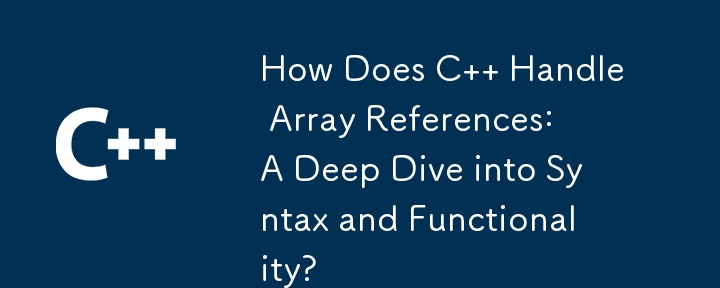Home >Backend Development >C++ >How Does C Handle Array References: A Deep Dive into Syntax and Functionality?
How Does C Handle Array References: A Deep Dive into Syntax and Functionality?
- DDDOriginal
- 2024-12-17 18:57:11301browse

Passing Arrays by Reference: Understanding the Syntax and Functionality
Consider the following function prototype:
This function accepts an array of 100 integers as a reference parameter. However, the syntax "&myArray[100]" may seem confusing at first glance. Here's a detailed breakdown of its meaning:
- &myArray: This indicates that the function takes a reference to an array. Without this ampersand (&), it would be an array of references to integers, which is not allowed in C .
- []: These brackets represent the declaration of an array. In this case, it specifies that the reference parameter is an array.
- 100: Finally, the number 100 denotes the size of the array, which in this case is 100 integers.
To clarify further, the following function prototypes are equivalent and accept an array of any size as a reference parameter:
In these prototypes, the asterisk () indicates a pointer to the array's first element. The compiler treats all of these prototypes as taking an int parameter.
However, when using the reference syntax:
the function only accepts arrays of exactly 100 integers. This means that you can safely use sizeof(x) to determine the size of the array within the function.
On the other hand, the following syntax is invalid:
This syntax is parsed as "an array of references," which is not a legal declaration in C .
The above is the detailed content of How Does C Handle Array References: A Deep Dive into Syntax and Functionality?. For more information, please follow other related articles on the PHP Chinese website!
Related articles
See more- C++ compilation error: A header file is referenced multiple times, how to solve it?
- C++ compilation error: wrong function parameters, how to fix it?
- C++ error: The constructor must be declared in the public area, how to deal with it?
- Process management and thread synchronization in C++
- How to deal with data splitting problems in C++ development

